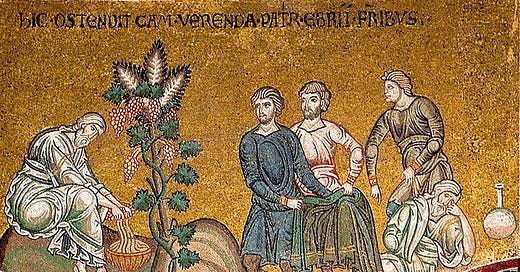Ham’s Black Lands
“And Ham, the father of Canaan, saw his father’s nakedness and told his two brothers outside.” Genesis 9:22
Welcome to the first post on Noah’s son, Ham. For those interested in Ham, this is the start of Book of Ham dealing with an analysis of Ham’s descendants. If you are looking for the start of the series, Japheth can be found here. I hope you enjoy this series on Ham.
Noah’s son, often known as “Ham” in English translations, is known as “Cham” in Hebrew with a hard ‘ch’. The obvious, or straight (peshat), meaning of this term in Hebrew is translated as “Hot” and could possibly be in reference to the general climate of the Ham’s lands. While a literal Hebrew meaning for the word certainly does work given that the historically understood areas of Ham’s territory tend to be overwhelmingly hot, if not the hottest on the planet, there is perhaps a deeper meaning hinted at that can be pulled from this term to synthesize with the Hebrew definition.
While we will fully analyze territorial claims in later chapters, it is well understood that Ham’s son Mizraim means Egypt, and Cush represents the territory further south. The exact specifics of these terms is much more complex than they appear on the surface, but for now this serves as a generalized location for the cultures that Ham goes on to found. It would therefore be prudent to turn toward Ancient Egyptian sources, given their prevalence and well maintained linguistic records.
In Ancient Egyptian the term “Ham” would be phonetically equivalent to the word “ḥm” pronounced identical to the Hebrew. The term translates simply to something like “servant”, but a more accurate and specific version of the word servant would be the term “incarnation”. In this sense, the term “ḥm” can be understood as hinting at a sort of “incarnation of a god”, and was often applied specifically to the Kingship of Egypt which was “incarnated” generationally between Pharaohs. These Pharaohs would thus serve as the actual incarnation of the god themselves, something well known through Egyptology and modern research.
Similarly, the term is often erroneously translated to mean “majesty” due to its associations with the incarnation of Egyptian Kingship. However, interesting in the nuanced usage of this term is that “ḥm” always specifically referred to Egyptian Kings, never foreign kings, who would be referred to with the term ḥqꜣ, a more simplified form of “ruler”. The implication in this sense is that the term was not just merely a signifier of royalty, and nobility, but really came to represent the central religious authority of Egypt and the generalized idolatry practiced throughout Ham’s descendants lands.
If we inquire into related terms we find the Ancient Egyptian word for their own homeland, known endogenously as “Kmt”, and pronounced something like “Kemet” with a ‘Kh’ sound similar, but not identical to the ‘ch’ from Cham. It would be quite obvious for the founder of Egypt, or his father to have a name similar to the main nation Ham is known from in the Torah. The term appears like something of a combination of the term “km” meaning “black” and the denotation for “lands” meaning “black lands”. While some would jump to presume this term references the “black people” of Africa, and while in part some descendants of Ham are indeed Black Africans, the actual term is in reference to the fertile soil of the Nile, which was darkened black by the nutritional content. Universally the term “black earth” or “black lands” is used to refer to fertile territory, for example with the modern Russian term “Chernozem” or “Black Ground” referencing to the high humus, phosphorus, and ammonia content of the soil around the Crimean steppe, the theoretical homeland for the Japhethites in our previous volume. In some sense, this juxtaposes Ham and Japheth’s territories as fertile locations for the founding of new nations
.
Whatever the reason for this term, it is clear that all of its multitude of meanings applied to Ham’s principal territories, and has a multi-faceted depth to the term's true meaning. Ultimately, the most root form of the term within Ham’s own language would be the form implying servant, or incarnation. In that sense, this term helps explain much of the Torah’s language surrounding Ham’s son Canaan, and the curse that Canaan would be a slave unto his brothers. Not just the simplistic meaning that harkens to notions of African slavery, but to the true meaning. That Ham, and all his descendants, will be “enslaved” to the incarnations of idols that will plague their nations, leading them to ruin.
I hope you enjoyed this first section dealing with Ham, which will be a multiple week series extending about as long as Japheth. Comments are welcome, and encouraged, along with any criticisms and suggestions. Please leave a comment below since that really supports traction, and please make sure to also leave a like to boost the algorithm.
Essentially this will be a fresh start, dealing with another lineage of Noah’s children. For newcomers, this is an ideal place to begin even if you haven’t read Japheth, yet. There will be some information that carries over, but for the savvy reader they would be familiar enough with most subjects that they can begin here without any trouble.
Enjoy the series. Thank you for reading.
Link to the next post







Thank you for the post.
Enjoyed reading the next chapter following the first writings. Excellent writing and explanation.